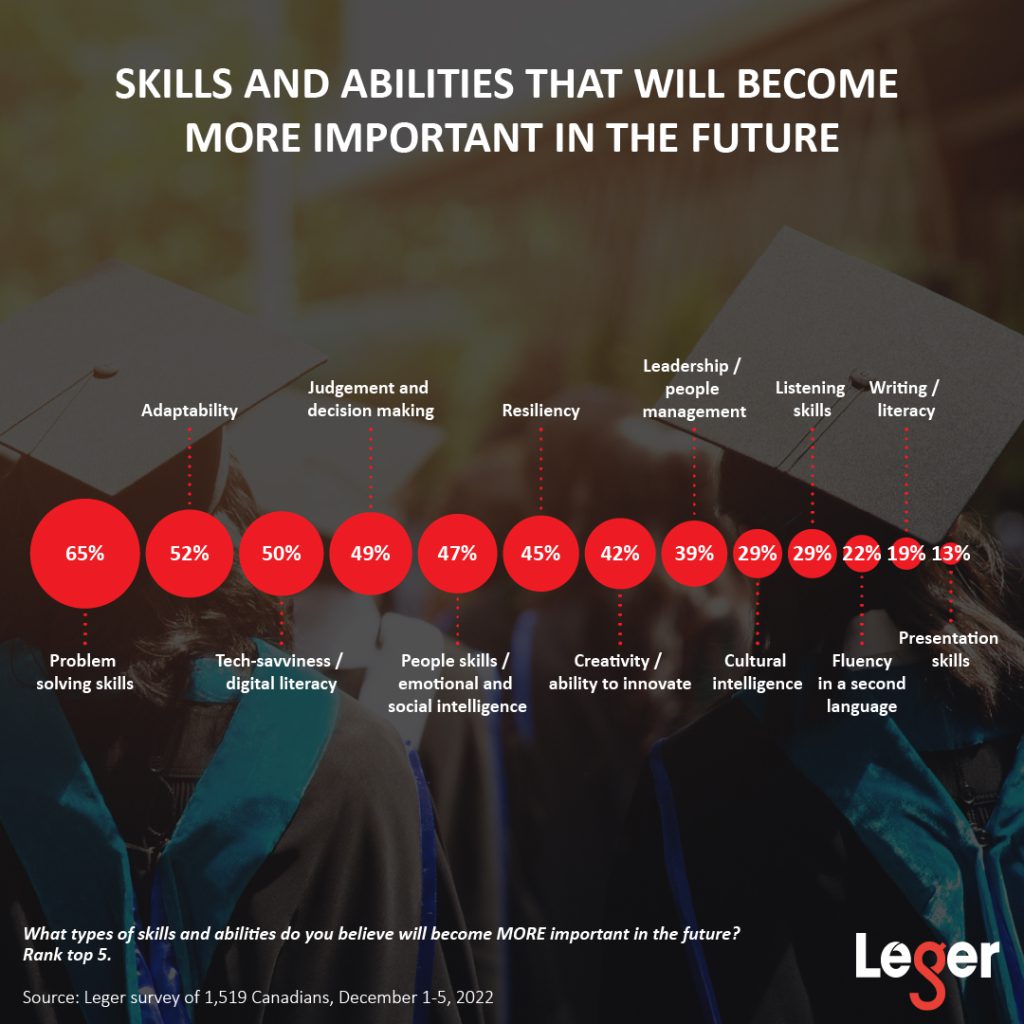This edition of Leger’s Tech and Innovation series explores Canadians’ perspectives on the future of education in Canada, including the role of post-secondary education, online vs. traditional learning environments, desired skill sets and more.
Leger’s Tech and Innovation series, launched in 2022, explores Canadians’ perceptions of technologies and innovations that are shaping our future. Led by Leger’s Alberta office, the series is designed to help governments and businesses understand public opinion, an important factor when designing new policies or preparing new product and service offerings. A new survey (accompanied by a free report) is released monthly.
FILL IN THE FORM BELOW TO DOWNLOAD THE FREE REPORT
ARE YOU INTERESTED IN LEARNING MORE? CLICK HERE TO CONTACT US.
OTHER ARTICLES IN THIS SERIES
Renewable Energy and Going Green
Tech Industry Talent, Attraction and Retention
Attitudes Toward Technology and the Metaverse
Fintech in Canada: Online Banking, NFTs, DeFi and More
Where is the future of education in Canada headed for generations to come? Decades ago, the path was fairly simple: go to school, get a job, enter the workforce. However, the recent increase in online schooling (propelled by the COVID-19 pandemic) and shifts in the skills most important to employers are reshaping the future of education in Canada as we know it. What are students looking for? Which skills will become more important? Should industry play a larger role in post-secondary education? We conducted a large-scale survey of Canadians to find out.
SURVEY HIGHLIGHTS: FUTURE OF EDUCATION IN CANADA
THERE IS A GAP IN UNIVERSITIES PROVIDING PRACTICAL, CAREER-FOCUSED SKILLS.
Canadians believe that universities and colleges need to teach more practical and career-focused skills (83%).
Furthermore, three-quarters of Canadians (73%) believe practical work experience is becoming more important than education. This may be because post-secondaries are not teaching enough practical skills.
CANADIANS BELIEVE PROBLEM SOLVING, ADAPTABILITY, AND DIGITAL LITERACY ARE THE SKILLS OF THE FUTURE.
These are the top skills Canadians believe will become more important in the future.
Judgement/decision making, people skills, and resiliency are also viewed as abilities/skills that will become more important.

CANADIANS WANT INDUSTRY TO PLAY A DRASTICALLY LARGER ROLE IN POST-SECONDARY EDUCATION.
Canadians say 42% of post-secondary education should be provided by industry (e.g., businesses, professionals, associations), while 58% should be provided by educational institutions.
This is vastly different than how most post-secondary education is delivered today, as educational institutions typically provide a majority of the education.
NON-TRADITIONAL FORMS OF EDUCATION MAY OFFER STIFF COMPETITION TO TRADITIONAL POST-SECONDARIES IN THE FUTURE.
If all types of education were recognized equally by employers, consideration among recent/current/prospective students or parents of students is high for degrees/certificates from reputable companies (e.g., Apple, IBM, and RBC) (72%), as well as micro-credentials/courses for specialized skills (72%).
Consideration for traditional post-secondaries such as universities/colleges (82%) and trade/vocational schools (78%) is only slightly higher.
SURVEY METHODOLOGY
- A total of 1,519 Canadians were surveyed from December 1 to 5, 2022. The respondents were randomly selected from Leger’s LEO panel.
- To ensure the sample is representative of the entire adult population of Canada, the raw data was weighted according to the actual distribution of the population based on gender, age and region using data from Statistics Canada’s latest available census.
- As a comparison, a probability sample of this size would have a margin of error of ±2.5% with a confidence interval of 95% (19 times out of 20).
